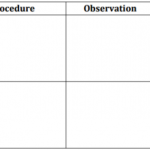KNEC KCSE Biology Paper 2 Question Paper / 2016 KASSU JET JOINT EXAMINATION
2016 KASSU JET JOINT EXAMINATION
Biology Paper 2
SECTION A (40 Marks)
Answer all the questions in this section in the spaces provided
A couple has three children, the mother had blood group A and the father had blood group B while one
of the children had blood group 0.
(a) (i) What were the genotypes of the parents? (1mark)
Father
…………………………………………………………………………………………………………
Mother
…………………………………………………………………………………………………………
(ii) What was the genotype of the child with blood group 0? (1mark)
…………………………………………………………………………………………………………
(b) Work out using a punnet square the genotypes of the other children. (4 marks)
(c) Which child can receive blood from any member of the family? (1mark)
…………………………………………………………………………………………………………
(d) State the percentage of children who can donate blood to all blood groups. (1mark)
…………………………………………………………………………………………………………
8 marks
Below is a diagram of a structure found in Eukaryotic cells? Study it and answer the questions that
follow.
a) Identify the structure (1 mark)
……………………………………………………………………………………………….…………
b) State two functions of the structure (2 marks)
i.
…………………………………………………………………………………………………………
ii.
…………………………………………………………………………………………………………
c) (i) Name one organelle found in animal cells but absent in plant cells (1 mark)
………………………………………………………………………………………..…………………
ii) State one function of the organelle you have named in(c) above (1 mark)
…………………………………………………………………………………………………………
d) Briefly explain cell biology as an evidence of evolution (3 marks)
…………………………………………………………………………………………………………
…………………………………………………………………………………………………………
…………………………………………………………………………………………………………
…………………………………………………………………………………………………………
…………………………………………………………………………………………………………
…………………………………………………………………………………………………………
…………………………………………………………………………………………………………
…………………………………………………………………………………………………………
8 marks
Below is a diagram of a plant a form three student collected while carrying out an ecological study?
(a) With reasons identify the division into which the students classified the plant.
Division (1mark)
………………………………………………………………………………………………………
Reasons (2marks)
…………………………………………………………………………………………………………
……………………………………………………………………………………………………….…
b) (i) Name the structure that produces spores in this plant. (1mark)
………………………………………………………………..…………………………………………
………………………………………………………………………………………………….………
(ii) State two differences between the plant division above and that of the division
spermatophyta. ( 2 marks)
c) Give two distinguishing features of class Amphibia (2marks)
a) ………………………………………………………………………………………………
b) ………………………………………………………………………………………………
8 marks
The diagram below represents human foetus in a uterus.
a) Name the part labeled D. (1 mark)
……………………………………………………………………………………………………………
b) i) Name the types of blood vessels found in the structure labeled C. (2 marks)
…………………………………………………………………………………………………………….
ii) State the differences in composition of blood found in the vessels named in (b) (i) above. (2 marks)
iii) State two importance of the fluid found in part B (2 marks)
……………………………………………………………………………………………………………
……………………………………………………………………………………………………………
……………………………………………………………………………………………………………..
iv) State the role of progesterone during pregnancy (1 mark)
……………………………………………………………………………………………………………
……………………………………………………………………………………………………………
……………………………………………………………………………………………………………
8 marks
The diagram below represents three types of neurons found in a mammalian body.
(a) Name the neurons X, Y and Z (3marks)
X………………………………………………………………………………………………………..
Y……………………………………………………………………………………………………….
Z………………………………………………………………………………………………………
(b) Name the chemical substance responsible for the transmission of an impulse across the gap
labelled W. (1mark)
……………………………………………………………………………………………………….….
(c) State two functions of the part labelled M. (2marks)
…………………………………………………………………………………………………..………
……………………………………………………………………………………………………….….
(d) In which part of the spinal cord is neurone Y located? (1mark)
……………………………………………………………………………………………………….….
(e) Using arrows indicate on the diagrams the direction followed by nerve impulse leading to a
response. (1mark)
8 marks
SECTION B (40 Marks)
Answer questions 6(compulsory) and either questions 7 or 8 in the spaces provided
During germination and growth of a cereal, the dry weight of endosperm, the embryo and total dry
weight were determined at two – day intervals. The results are shown in the table below.
| Time after planting(days) |
Dry weight of endosperm |
Dry weight of embryo (mg ) |
Total dry weight (mg) |
| 0 | 43 | 2 | 45 |
| 2 | 40 | 2 | 42 |
| 4 | 33 | 7 | 40 |
| 6 | 20 | 17 | 37 |
| 8 | 10 | 25 | 35 |
| 10 | 6 | 33 | 39 |
a) Using the same axes, draw graphs of dry weigh of endosperm, embryo and the total dry weight
against time (8marks)
b) What was the dry weight of the endosperm and embryo on the 5th day? (2marks)
Endosperm
……………………………………………………………………………………………………….….
Embryo
……………………………………………………………………………………………………….….
c) Account for:
i) Decrease in dry weight of endosperm from day 0 to 10 (2marks)
…………………………………………………………………………………………………………
…………………………………………………………………………………………………………
…………………………………………………………………………………………………………
ii) Increase in dry weight of embryo from day 0 day 10 (2marks)
…………………………………………………………………………………………………………
…………………………………………………………………………………………………………
…………………………………………………………………………………………………………
iii) Decrease in total dry weight from day 0 to day 8 (2marks)
…………………………………………………………………………………………………………
…………………………………………………………………………………………………………
…………………………………………………………………………………………………………
d) State the role of the following in germination (2marks)
i) Glucose
…………………………………………………………………………………………………………
…………………………………………………………………………………………………………
ii) Enzymes
…………………………………………………………………………………………………………
…………………………………………………………………………………………………………
e) How are the foliage leaves adapted to their function (2 marks)
…………………………………………………………………………………………………………
…………………………………………………………………………………………………………
…………………………………………………………………………………………………………
20 marks
(a) Describe the role of hormones in blood sugar regulation (10 marks)
(b) Explain how halophytes are adapted to their habitat (10 marks)
…………………………………………………………………………………………………………
…………………………………………………………………………………………………………
…………………………………………………………………………………………………………
…………………………………………………………………………………………………………
…………………………………………………………………………………………………………
…………………………………………………………………………………………………………
…………………………………………………………………………………………………………
…………………………………………………………………………………………………………
…………………………………………………………………………………………………………
…………………………………………………………………………………………………………..
…………………………………………………………………………………………………………
…………………………………………………………………………………………………………
…………………………………………………………………………………………………………
…………………………………………………………………………………………………………
…………………………………………………………………………………………………………
…………………………………………………………………………………………………………
…………………………………………………………………………………………………………
…………………………………………………………………………………………………………
…………………………………………………………………………………………………………
…………………………………………………………………………………………………………..
…………………………………………………………………………………………………………
…………………………………………………………………………………………………………
…………………………………………………………………………………………………………
…………………………………………………………………………………………………………
…………………………………………………………………………………………………………
…………………………………………………………………………………………………………
…………………………………………………………………………………………………………
…………………………………………………………………………………………………………
…………………………………………………………………………………………………………
20 marks
(a) Explain the adaptations of thoracic, cervical and lumbar vertebrae to their functions (12 marks)
(b) Describe the structural factors affecting transpiration (8 marks)
…………………………………………………………………………………………………………
…………………………………………………………………………………………………………
…………………………………………………………………………………………………………
…………………………………………………………………………………………………………
…………………………………………………………………………………………………………
…………………………………………………………………………………………………………
…………………………………………………………………………………………………………
…………………………………………………………………………………………………………
…………………………………………………………………………………………………………
…………………………………………………………………………………………………………..
…………………………………………………………………………………………………………
…………………………………………………………………………………………………………
…………………………………………………………………………………………………………
…………………………………………………………………………………………………………
…………………………………………………………………………………………………………
…………………………………………………………………………………………………………
…………………………………………………………………………………………………………
…………………………………………………………………………………………………………
…………………………………………………………………………………………………………
…………………………………………………………………………………………………………..
…………………………………………………………………………………………………………
…………………………………………………………………………………………………………
…………………………………………………………………………………………………………
…………………………………………………………………………………………………………
…………………………………………………………………………………………………………
…………………………………………………………………………………………………………
…………………………………………………………………………………………………………
…………………………………………………………………………………………………………
…………………………………………………………………………………………………………
20 marks










